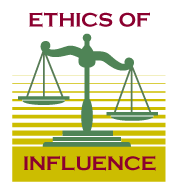
Why Influence?
Everyday
Modern
Definitions
# of Tactics?
16 Tactics
53 Tactics
Ethics I
Ethics II
Disciplines
Approach
Bad Info
Structure
Mindfulness
Mindlessness
Matrix
Bibliography
Classwork
Links
![]()
It's necessary to define ethical parameters whenever a person's
ability to choose freely is curtailed. On the other hand, I'd
argue that most of us wildly overestimate the amount of freedom
we think we have. 
Those who do not understand the power of social influence may live in the happy delusion of unlimited freedom, but the influence expert is aware that social influence is powerful enough to make certain actions and thoughts extremely likely on the part of the influence target.
I'd contend we only enjoy the limited amount of freedom that remains between the powerful influences that largely determine our everyday lives. Because we are not consciously aware of those influences, we perceive freedom.
Take for example the story of the unwitting psychology professor as told by Steven Hassan. A psychology professor was teaching his students the basics of behavioristic psychology, of rewards, punishments, and shaping. The story goes that his students decided to test the professor's theories--on the professor himself! Whenever the professor lectured from the right side of the room, the students became distracted and noisy. When he moved to the left side of the room, they listened with rapt attention. By selectively rewarding the professor's location in the room, the class was able to shape the professor's lecturing behavior to the point that he would enter the room and walk immediately to the left wall, leaning against it during the entire lecture.
When the students finally revealed their prank to the professor, Hassan tells us that an interesting thing occurred: the professor denied any influence over his behavior, and insisted that lecturing while leaning against the left wall was simply his preferred style! Certainly the professor perceived no limitation of his freedom. Despite the professor's protestations of autonomy, what do you think? Was he truly acting of his own freewill, if his class manipulated his actions?
Ethical issues become increasingly complicated when it becomes apparent that psychological determinants and restrictions to freedom lie, to a large extent, in the minds of those who are being influenced--rather than being imposed from the outside in a coercive nature. For this reason, social influence is often compared to Jujitsu, a pugilistic art that redirects the aggressor's own power against himself. A running, enraged 200-lb man has generated considerable kinetic energy that a savvy opponent can use against him--perhaps by merely tripping him as he sails past.
Analogously, this may be how a salesperson views a greedy, rapacious customer--as a 200-lb appetite demanding a desirable commodity at a cut-to-the-bone price. The salesperson's ability to surreptitiously redirect that energy into a profitable sale would tempt even the most ethical among us.
If you are old enough to remember the Kung Fu television program, whose side were you on when the prejudiced, muscle-bound drunk lunged at peace-loving David Carradine with a broken beer bottle? Did you enjoy watching Carradine turn the enraged belligerent's charge into a devastating floor-slam? Even the use of coercive force is ethically murky. Since persuasion isn't force or coercion, the ethicality of influence quickly transcends off-handed pronouncements of right or wrong.
One scholar, Dr. Margaret Thaler Singer, provides us with a taxonomy of levels of influence--the basis of the continuum presented on the following page. Notice that upon examination, the continuum defies simple right-or-wrong categorization . . .
All rights reserved.
www.workingpsychology.com
